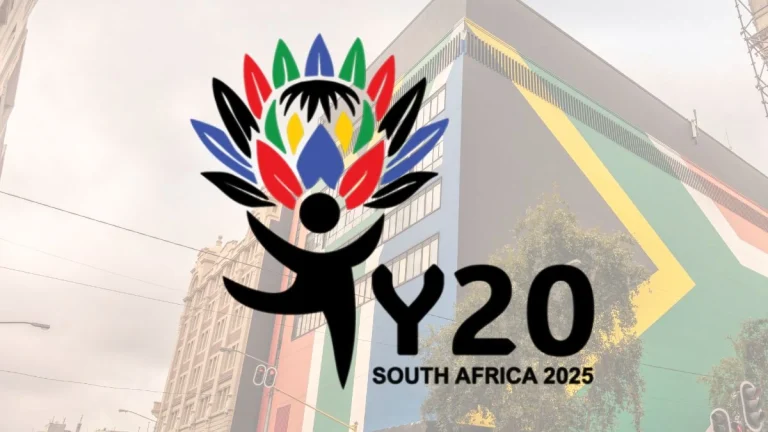South Africa is grappling with an acute youth unemployment crisis. This reality was brought sharply into focus at the recent Y20 Summit. This gathering of young leaders, policymakers, and experts underlined the urgent need to address the challenges facing young jobseekers. Moreover, it highlighted the need to forge sustainable pathways toward employment.
Thank you for reading this post, don't forget to subscribe!ALSO READ: G20 Summit 2025: P20 Women’s Parliament Pushes for Inclusive Growth and Women’s Empowerment
Table of contents
- What is the Y20 Summit?
- Current State of Youth Unemployment in South Africa
- Barriers to Youth Employment
- Gender Inequalities in the Labour Market
- Education and Skills Gaps
- Government and Private Sector Initiatives
- Highlights from the Y20 Summit
- Social and Economic Impact
- The Way Forward
- Empowering Young People
- A Call to Collective Action
What is the Y20 Summit?
The Y20 Summit is a global platform that brings together young leaders from various countries to discuss pressing issues affecting youth worldwide. As an official engagement group of the G20, it provides young people the opportunity to voice their perspectives, contribute to policy recommendations, and engage with world leaders on topics such as employment, education, climate change, and social justice. The summit fosters international cooperation and empowers youth to play an active role in shaping sustainable economic and social development.
Current State of Youth Unemployment in South Africa
According to Statistics South Africa’s Quarterly Labour Force Survey for the first quarter of 2025, youth unemployment, defined as those aged 15 to 24, soared to an alarming 62.4%. More broadly, the unemployment rate among young people aged 15 to 34 stood at 46.1%. This marks an increase of 9.2 percentage points over the past decade. This translates to more than 4.8 million unemployed young South Africans struggling to enter the workforce.
Barriers to Youth Employment
One of the primary barriers is a lack of work experience. Nearly six in ten unemployed youth reported having no previous job experience. This lack of opportunity creates a vicious cycle where young people cannot gain experience without first being hired. Regional disparities compound difficulties. Provinces like North West and Eastern Cape report youth unemployment rates surpassing 54%, alongside very low labor participation rates. Addressing these at forums like Y20 provides momentum.
Gender Inequalities in the Labour Market
Gender gaps remain stark. Young women bear disproportionate burdens of unemployment and economic exclusion. The NEET (Not in Employment, Education or Training) rate is notably higher among young women. Nearly half are unable to find work or engage in education and training. These disparities reflect entrenched social inequalities that hamper inclusive growth. Solutions were discussed at the Y20 Summit to address these issues.
Education and Skills Gaps
Education plays a pivotal role. Youth lacking a matric certificate face an unemployment rate exceeding 50%, compared to significantly lower rates among university graduates. Vocational and technical training provide better prospects but are yet to reach sufficient scale. Addressing educational quality and access is critical to enhancing youth employability. The Y20 Summit emphasized these concerns.
Government and Private Sector Initiatives
The South African government has launched the Unemployment Insurance Fund Labour Activation Program. It invests heavily in sectors like agriculture, ICT, construction, and manufacturing to stimulate job creation. Partnerships with private enterprises and NGOs focus on skills development, entrepreneurship, and youth empowerment. Engagements like the Y20 Summit inspire collaborative strategies.
Highlights from the Y20 Summit
The Y20 Summit showcased youth voices calling for greater inclusion in policy design. Additionally, they demanded improved access to quality education and vocational training. Participants stressed innovation, digital skills, and green economy opportunities as vital to the future workforce.
Social and Economic Impact
Persistent youth unemployment threatens social cohesion and economic stability. It exacerbates poverty, increases vulnerability to crime, and contributes to a demotivated generation with lost potential. Mitigating these risks requires sustained, coordinated actions from government, civil society, and business. Involving platforms like the Y20 Summit ensures the voices of young leaders guide these efforts.
The Way Forward
Addressing youth unemployment demands a multifaceted approach. This includes reforming education systems, expanding internship and apprenticeship programs, enhancing digital literacy, and targeting support to disadvantaged regions and groups. Political will, adequate funding, and monitoring are key. Such discussions are regularly held during the Y20 Summit to influence policy change.
Empowering Young People
Empowerment extends beyond employment to fostering entrepreneurship, social innovation, and civic participation. When young people are equipped and engaged, they become active contributors to South Africa’s economic recovery and growth. Dialogues during gatherings such as the Y20 Summit play a crucial role.
A Call to Collective Action
The Youth Unemployment Crisis at the Y20 Summit underscored a shared responsibility to act decisively. With persistent high jobless rates among youth, South Africa’s future depends on collaborative solutions that unlock opportunities. Additionally, these solutions nurture skills and build resilient pathways to employment.




